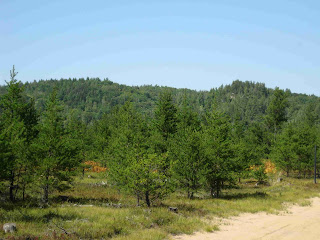Maybe this should have been posted prior to our previous article about the Qualified Forest Program, but better late than never. From the seat at my desk, it seems to me that more people are familiar with the Commercial Forest Program, or Commercial Forest Act (CFA), than any other type of State property tax legislation. There are many reasons for this, but it is undeniable that most owners, buyers, and seller of land in Northern Michigan's Upper Peninsula have heard of Michigan's CFA program. Hundreds of thousands of acres enrolled in the Upper Peninsula alone. Property ownership under this act is widespread and more of the corporate owned parcel are being sold to private entities every day bringing a greater variety of the participants in the program. So what does this mean?
We consistently receive questions about this act and properties that are registered in the program. The most common entities that hold property in Commercial Forest are timber companies. The CFA program was started as a tax savings for large corporate land owners that also provides the public with use of those lands. It is seen as a win/win for both the land owners and the public. From the State of Michigan's point of view, providing an incentive for additional lands to be open to public access helps the recreational tourism business that drives the State's, and more specifically, the Upper Peninsula's economies.
In short, a property in CFA is open to non-motorized public access for recreation purposes. This includes hunting and fishing. There are details for restriction on use, but they are very similar to the guidelines of the use of State lands. The benefit to the landowner for providing this public access is a huge tax savings. The amounts vary greatly, but as an example; a 40 acre parcel may have an annual tax of $800. This same property in CFA would have an annual tax of about $50. Private property is taxed based on the taxable value of the property multiplied by the millage. CFA tax is a $1.20 per acre annually. What does this mean for owners, buyers, and sellers of Real Estate?
If you are an owner of a large acreage property with no dwellings or improvements, the CFA program can be a huge tax savings. If you plan to buy and hold a property for a long-term investment this can be of great value. The downside is that a property in CFA carries a lower market value because of the penalties involved if an owner withdraws. For a seller, it can be harder to market a property because buyers may not want the property to be open to public access. The penalty for withdrawing a property is complicated, but it boils down to about $100 per acre. If two properties are equal in value, one is in CFA and the other is private, the private parcel would be worth $100/acre more.
What I have seen as a recent problem with the Commercial Forest Act is that a buyer of a parcel that is in the act may not fully understand their obligations. If they wish to keep the parcel in the CFA program, they need to file the correct forms along with a management plan for the property. They also need to be aware of the limitation that this places on their use of the property as well as the obligation to provide public access. If a buyer wishes to remove the parcel from CFA, they will pay the penalty of $100 per acre. Non-compliance with the required forms and or payments can result in tax liens being placed on the property.
The Commercial Forest Act was crafted with the large corporate land owner in mind. Smaller owners of properties of 40 contiguous acres may list their lands under the act, but they need to be aware of the pros and cons prior to making that decision. When utilized correctly, the CFA program can be a great aid to landowners in Michigan. The important thing is to do your research prior to putting lands in the CFA program or purchasing property listed under the act. For more information visit the State of Michigan's website or see the link below for some details on the Commercial Forest Act. To view properties currently available in Commercial Forest visit Northern Michigan Land Brokers website or call 1-866-231-5263.

